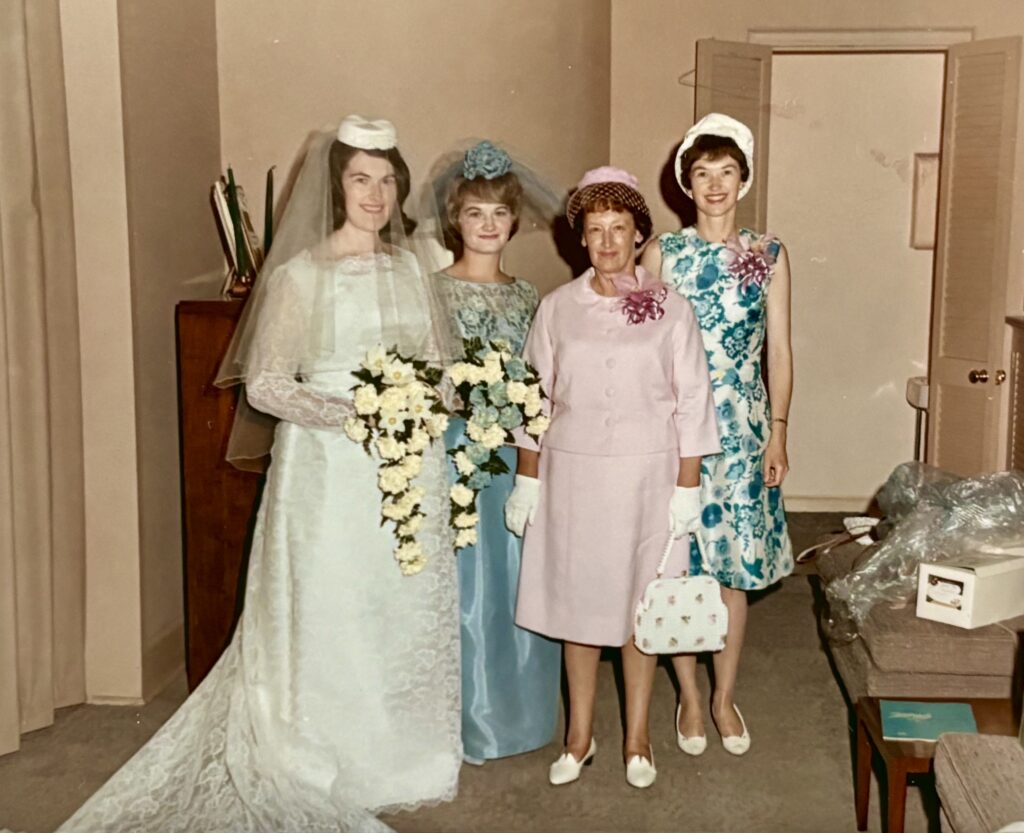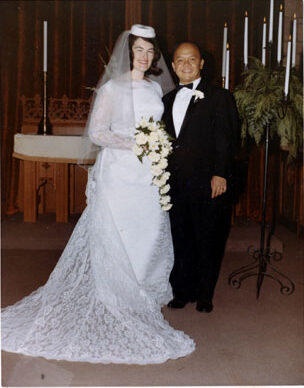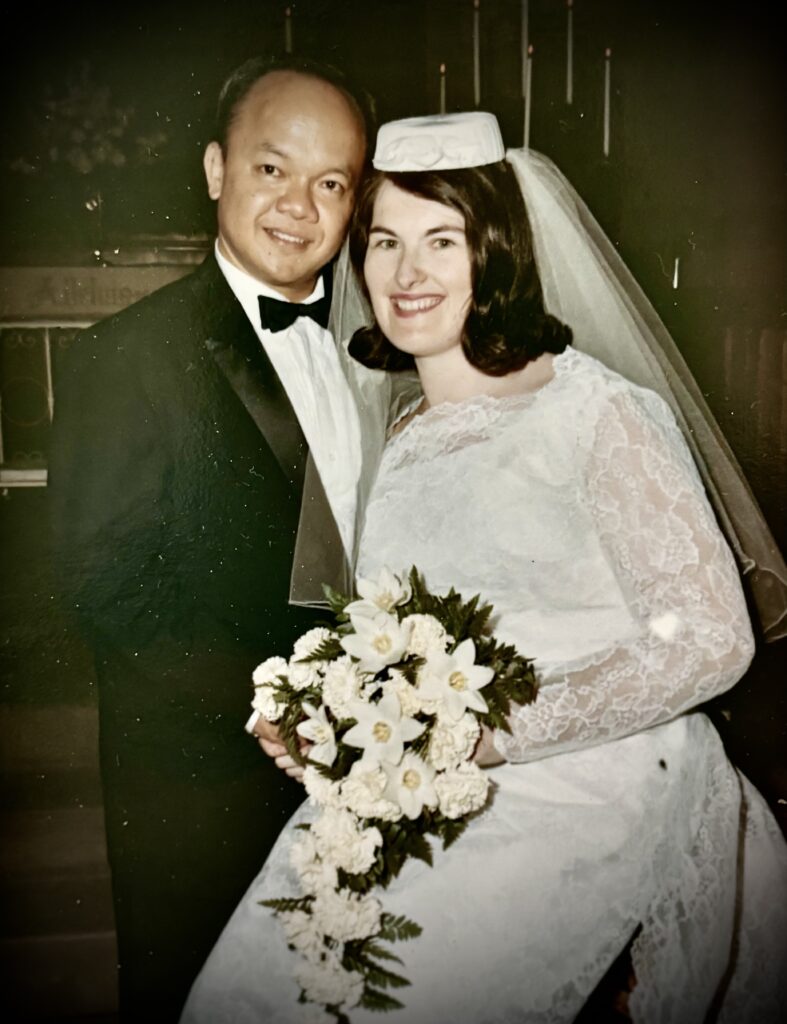Note: for more information, pictures, etc. please visit the Harriet Santos website: HarrietSantos.com
Our Wedding: June 5, 1966
Each bride and groom exclaims that their wedding is the greatest and most unique of any. After the long months of preparation, they have every right to claim top priority for the most beautiful two hours of their lives. This is the case with Mr. and Mrs. Rosendo E. Santos, Jr., who were married at Wesley Methodist Church, Morgantown, West Virginia, this June 5, 1966. This couple testify loudly that their marriage was either an act of fate or preferably the marvelous working of God. The persons most influential to the couple would also say that the story of their courtship and final union is interesting enough to be recounted.
Mr. Santos, a native of the Philippine Islands, came to the United States for the second time in 1961 to begin studying for a doctoral degree in Music Composition. A noted composer and professor at the University of the Philippines, Rosendo (Ros) looked for new challenges in the area of composition that could be found in this country. From 1961-1964, he completed his Master’s degree and more than half of his studies for the Ph.D at Catholic University of America in Washington, D.C. Because the studies in his special interest were limited, it was suggested that he complete his degree at West Virginia University. This he decided to do.
At West Virginia University, the foreign student enrollment is quite high. One of the plans for aiding these students is the host family idea. Ros was lucky to be given Dr. and Mrs. William Vehse as his hosts. Neither the Vehse’s or Ros knew initially that both parties were talented in the area of music, but it did not take much time to discover this creative interest. Not only were Bill and Edith Vehse eager to make Ros feel welcome to their home, but as devout Christians, they invited him to become involved in the life of the church—Wesley Methodist Church. It was through their invitation to have Ros sing in the choir that he was able to meet and know Harriet Clendenin, the new Director of Christian Education at Wesley Church. She woo was a trained musician, especially in singing. Through their active participation in the choir, they became acquainted, grew involved with each other, and discovered a deep love which led to union. In 1965, Ros completed formal studies for his Ph. D. and took a position as Professor of Music Theory and Composition at Howard University, Washington, D.C. Even during the many months away from Morgantown, Wesley Church was important to him. Each time that he visited, he sang in the choir, helped with activities, and wrote several compositions to be used by the church choirs. It is not hard to understand why both Harriet and Ros sought to plan the most meaningful wedding possible since the church was the setting for their meeting and courtship.
According to the new rubrics in the Methodist Book of Worship, Holy Communion should be performed separately from the wedding ceremony. Dr. Jennings Fast, in planning with the couple, suggested that the wedding rehearsal be climaxed with the celebration of this sacrament On June 4, nearly fifty guests were invited to have supper with Ros and Harriet. It was held at the church and several ladies from the Women’s Society of Christian Service cooked supper for the guests. Five girls from both the Junior High and Senior High Methodist Youth Fellowship served the food. Among the guests were the Surperintendents of the Church School divisions and several other couples who had meant so much to Ros and Harriet. Following the meal, there was planned a musicale in which talent from Wesley Church was asked to present a musical number. Both the Ministers shared their talent and the whole group of people were amazed at the talent of all the persons who performed. The climax of the evening was a solo sung by the bride and accompanied at the piano by the groom on the words of 13:1 Corinthians. After the wedding rehearsal, the evening was ended as the family and friends celebrated the Lord’s Supper.
The wedding itself was like a dream come true to the Santos’. Ros had written all of the music for the wedding including the Processional and Recessional, it was more than just a recital of nuptial music. Many of the solos sung by two singers were based upon scriptural passages which had meant much to the couple during their courtship. Bill and Edith again were involved greatly in the wedding because they played cello during the half-hour music prelude to the ceremony and Bill also served as best man. They even provided the honeymoon cottage following the wedding. Printed bulletins were given to each person who attended the wedding so that they could remember the occasion. A prayer was written on the bulletin to remind them of the sacred context of marriage.
The processional itself was also unique. Both ministers of the church processed up the center aisle followed by the groom and best man. Not only was the bride honored by te people standing but the same importance was given to all who participated in the ceremony. The couple asked that the ceremony be recorded that they could be reminded of their vows constantly in the future.
The expression most often heard after the wedding was, “It was truly a worship experience for me. It was simple, but unique in its beauty.”
What the couple felt at the end of their wedding was thanksgiving and gratitude to God. They were happy that their preparations had been rewarded, but what was more important was that their prayers had been answered and they could begin a new life together.
Written: June 11, 1966
Mrs. Rosendo E. Santos, Jr.


